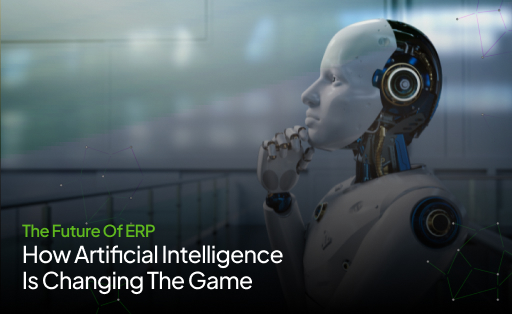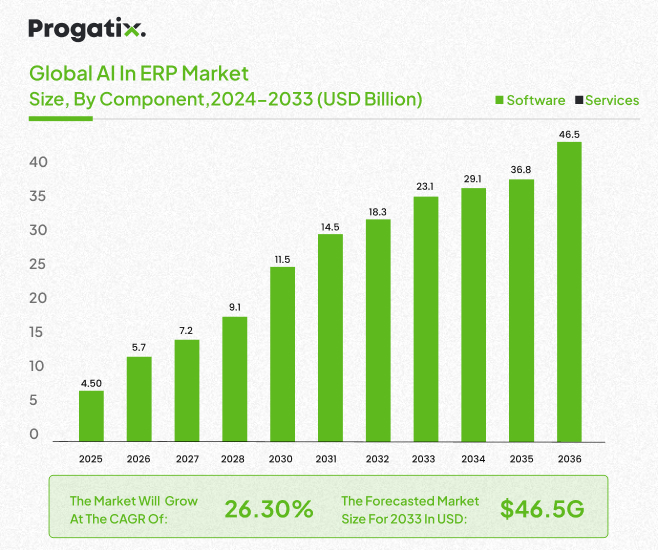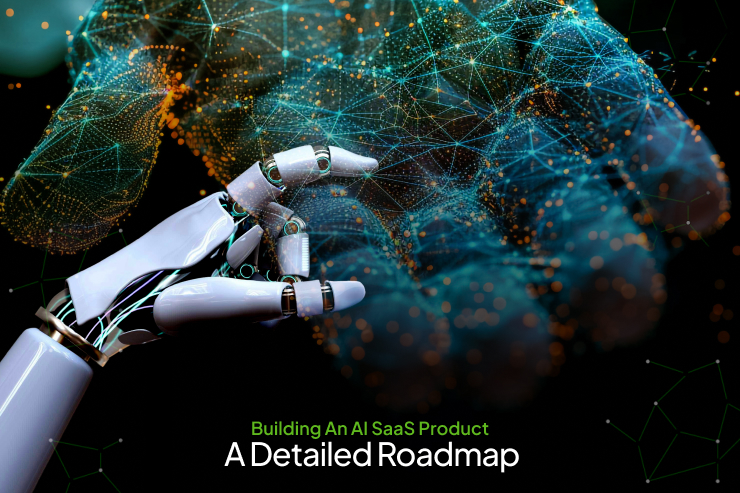The Future Of ERP: How Artificial Intelligence Is Changing The Game App Development

The integration of artificial intelligence (AI) into enterprise resource planning (ERP) systems has transformed the sector and has seemingly boundless potential. The latest advancements in artificial intelligence (AI) are genuinely revolutionizing ERP systems, despite the fact that AI has greatly enhanced business processes over the past 20 years.
Artificial intelligence (AI) has quickly evolved as a major force in almost every area of our lives, with programs like ChatGPT gaining popularity due to their capacity to process vast volumes of data, understand human language, and offer useful resources. However, the effects of AI on business technology have been developing for a number of years. Data entry, analysis, financial transactions, and simple customer service interactions were among the repetitive tasks that AI in ERP systems initially intended to automate.
As per market.us report, globally, the AI in the ERP Market is anticipated to be worth around USD 46.5 Billion by 2033, up from USD 4.5 billion in 2023, increasing at a CAGR of 26.30% during the forecast period from 2024 to 2033.
The Future Of ERP: How Artificial Intelligence Is Changing The Game
By managing increasingly complex tasks like sophisticated supply chain management and individualized customer service interactions, artificial intelligence is currently transforming ERP systems. This blog explores how the latest AI technologies are driving innovation in ERP systems, changing how businesses operate, and what businesses stand to gain from reaching their full potential.
What Is AI In ERP?
The way businesses manage their operations, resources, and decision-making has been completely transformed by the integration of AI into ERP systems. Routine tasks like processing invoices and more complex processes like predictive financial forecasting can be automated by ERP systems through the use of AI’s machine-learning (ML) algorithms and data analytics capabilities. ERP systems that use AI are able to analyse huge quantities of data and find patterns that help businesses predict trends and produce insightful information that helps them respond swiftly to changes in the market. To stay competitive, businesses can, for instance, proactively modify production schedules, advertising strategies, or product development plans in response to shifts in demand by examining trends in consumer behaviour and market dynamics.
Types Of AI Technologies In ERP
The impact of technologies on ERP systems is not limited to machine learning, natural language processing, and predictive analytics. Rapid innovations are also being driven by automated “bots,” anomaly analysis, and image recognition. The AI technologies that have the greatest impact on ERP systems are listed below.
-
Machine Learning
With its transformative capabilities that increase operational efficiency and lower errors across a variety of tasks, machine learning (ML) has emerged as one of the key components of sophisticated ERP systems. As per the Grand View Research’s report, the global machine learning market size was estimated at USD 36.73 billion in 2022 and is anticipated to grow at a compound annual growth rate (CAGR) of 34.8% from 2023 to 2030, reflecting the increasing acceptance of ML technologies.Without being specifically programmed to do so, machine learning (ML) enables ERP systems to identify patterns and learn from data to generate predictions. Therefore, by offering predictive analytics for improved planning and forecasting, for instance, machine learning (ML) can greatly improve decision-making in addition to automating repetitive tasks.
-
Natural Language Processing
NLP lays the foundation that allows computers to comprehend, interpret, and generate human language. In the past 2 years, large language model (LLM) technology, such as ChatGPT, has transformed NLP, enabling computers to generate more logical, relevant, and contextually right responses than traditional NLP models. It has also led to explosive growth in NLP technology. As per the fortunebusinessinsights, the global Natural Language Processing (NLP) market size was estimated at USD 24.10 billion in 2023 and is predicted to grow from USD 29.71 billion in 2024 to USD 158.04 billion by 2032, displaying a CAGR of 23.2% during the forecast period.
NLP enables ERP systems to process unstructured text, including emails, reports, and customer feedback, and comprehend user commands or queries in natural language. This feature is essential for deriving insights from data, automating data entry, and allowing conversational language user interaction with an ERP system. NLP’s influence is found in its capacity to close the gap between machine comprehension and human communication, enhancing ERP systems’ usability and accessibility.
-
Chatbots And Virtual Assistants
The interfaces that allow users to take advantage of NLP capabilities are chatbots and virtual assistants. These technologies rely on natural language processing (NLP) capabilities that help users with specific tasks within the ERP system, such as navigating software or obtaining information, by replicating conversations with scripted dialogues or AI-driven responses. They provide timely, 24/7 assistance to decrease the need for manual intervention, boosting operational efficacy and user satisfaction. Chatbots and virtual assistants are perfect for tasks requiring user interaction, such as customer service enquiries and employee self-service portals.
-
Predictive Analytics
A form of advanced analysis identified as predictive analytics, additionally referred to as predictive modelling, makes use of statistical algorithms, machine learning techniques, and historical data to identify potential future outcomes. It is crucial to ERP systems for tasks like financial planning, demand forecasting, and maintenance scheduling. To forecast future product demand, for example, predictive analysis may analyze past sales data and market trends. Companies can then adjust inventory levels and production plans to avoid overstock or stockouts. Including predictive analytics in ERP systems lessens costs by optimizing resource allocation, enhances customer satisfaction by expecting requirements, and addresses potential issues proactively before they worsen.
-
Image Recognition
Systems can recognise locations, items, people, and actions in photos due to image recognition. It can automate the processing and analysis of visual data, like scanned documents or video images, in ERP systems. For instance, the technology can locate errors or anomalies in raw materials to ensure manufacturing quality control. Also, it can be used to scan documents into editable and searchable formats and identify and track goods for better inventory control. Image recognition technology helps companies get detailed insights into their operations and goods by allowing the automated and precise analysis of visual data.
-
Robotic Process Automation (RPA)
RPA uses software robots, also known as “bots,” to automate routine tasks throughout applications, using predefined rules and instructions that imitate human interactions with computer systems. The popularity of bots is on the rise. Data entry and transaction processing are two essential but time-consuming and human error-prone tasks that RPA succeeds in the context of ERP systems. RPA allows employees to concentrate on more strategic projects by eliminating the need for human intervention.
-
Data Mining And Advanced Analytics
Finance, human resources (HR), and customer data are just a few of the many types of cross-departmental operational data that ERP systems combine. Finance, human resources (HR), and customer data are just a few of the many types of cross-departmental operational data that ERP systems combine. Data mining and advanced analytics encourage an in-depth knowledge of consumer behavior, market trends, and business operations by going through that data to find patterns, correlations, and insights that aren’t immediately apparent. Demand forecasting, cost reduction, and supply chain process optimization can all benefit significantly from data mining and advanced analytics technologies. In the end, more proactive, well-informed decisions result in rigorous operational efficiency, lower costs, and happier clients.
-
Sentiment Analysis
One aspect of natural language processing (NLP) is sentiment analysis, which analyses and categorizes emotions in text to provide information on anything from consumer sentiment to brand perception. Sentiment analysis can be a significant component of ERP systems. ERP systems may benefit greatly from sentiment analysis. It evaluates social media interactions, reviews, and comments to identify areas that need improvement and customer satisfaction. Technology for sentiment analysis can greatly improve customer engagement tactics, proactively resolve customer issues, and facilitate decision-making based on changing customer perceptions. Because of this, it is very helpful for tasks like understanding customer needs, adjusting marketing strategies, and keeping a tab on brand reputation.
-
Anomaly Detection
Natural disasters, supply chain interruptions, regulatory changes, and economic downturns are just a few of the unexpected challenges that all businesses must deal with. The ability of businesses to act fast to limit harm is often the key to success in spite of these setbacks. Anomaly detection technology can significantly influence businesses by identifying data points or incidents that significantly deviate from the norm. By promptly identifying anomalies that can indicate fraud, errors, or inefficiencies, anomaly detection in ERP systems required for monitoring and maintaining the integrity of financial transactions, operational processes, and supply chain logistics. For example, it can help detect fraud in financial operations, identify supply chain interruptions quickly, and identify quality control issues in manufacturing processes.
How Is AI Transforming ERP?
ERP system improvements have been driven by AI technology for many years. What started out as basic process automation has significantly progressed, with technologies like machine learning (ML) boosting operational efficiency and predictive analytics guiding decision-making. This is the area where AI-powered ERP systems are most apparent.
-
Automated Operations
One of the most effective applications for AI-powered ERP systems is automation. At its most basic level, AI can automate tasks like data entry, financial transactions, and simple customer support inquiries, which require accuracy, speed, and efficiency. However, AI tools like ML, NLP, and RPA can also learn from data, comprehend human language to improve customer service, and carry out repetitive but more complex tasks without the need for human assistance. More sophisticated automated decision-making and predictive analytics capabilities are the end result. For instance, real-time logistics and delivery route optimization using ML algorithms can significantly lower operating costs and increase customer satisfaction.
-
Advanced-Data Analysis
ERP systems can do more than just process data due to AI capabilities, which enable deep analysis that reveals insights that would be challenging, if not impossible, for humans to identify manually. Artificial intelligence (AI)-assisted ERP systems can analyse historical data and identify patterns, correlations, and trends with the aid of machine learning, data mining, and predictive analytics. This enables them to make better decisions and concentrate their strategic planning. They are crucial for forecasting market trends, modifying customer support, and making the best use of available resources. To improve the overall shopping experience and promote customer engagement, an AI-assisted ERP system, for example, can examine the purchase histories and preferences of each individual customer to offer tailored product recommendations and promotions.
-
Better Customer Service
AI is now a key factor in how sophisticated ERP systems are changing how businesses communicate with their clients, leading to increased efficiency, personalization, and responsiveness. For instance, NLP and ML technologies may decode consumer inquiries, forecast their needs, and deliver prompt, precise answers. Furthermore, chatbots driven by RPA are able to respond quickly to a variety of customer support queries, from monitoring order status to addressing prevalent issues such as billing inconsistencies. By doing this, customer support agents are able to focus on more complicated questions that call for a human touch while also speeding up response times.
The advantages that customers enjoy are significant and have quicker resolution times and more individualized interactions, which frequently result in increased customer satisfaction ratings for the company. Businesses can also anticipate and proactively address customer needs because of AI’s predictive capabilities.
-
Personalized Experiences
Businesses can improve customer and employee engagement by using AI in ERP systems to customize interactions and services to individual preferences and behaviors. For instance, ML and NLP can automatically modify interfaces, recommendations, and communications to meet individual needs by analyzing user data, preferences, and behaviors. Customers might get tailored product recommendations as a result of this, depending on their browsing or past purchases. Employees may benefit from a personalized dashboard that ranks information and tasks based on roles and work routines.
Personalized experiences offer significant advantages. Due to a closer alignment of offerings with customer needs, personalization can result in higher customer satisfaction, loyalty, and sales. A customized ERP experience for staff members can increase productivity and job satisfaction by reducing irrelevant information and simplifying task management.
-
Enhanced Forecasting
Some AI technologies, like machine learning (ML) for predictive analytics, deep learning (DL) for managing huge, complicated datasets, and natural language processing (NLP) for exploring unstructured data, can have a big impact on forecasting. Large amounts of data can be quickly organized by these technologies to find patterns and trends that human analysts may overlook. ERP systems are, therefore, better equipped to forecast supply chain interruptions, consumer behavior, and market trends. Furthermore, more precise forecasts allow businesses to better allocate resources, match supply and demand, and grab market opportunities, all of which enhance operational efficiency.
-
Continuous Learning And Improvement
A company’s ongoing cycle of improvement depends on AI technologies. They enable ERP systems to process and learn from both structured and unstructured data, identify trends, and forecast the future with constantly growing accuracy. For example, an ERP system with AI capabilities can continuously examine operational data to identify inefficiencies and suggest improvements. Because of this, a setting is created where processes are constantly improved in response to emerging knowledge and quick feedback. Artificial intelligence (AI) technologies enable continuous learning, which boosts operational efficiency, accelerates innovation, and improves agility and responsiveness to changes in the market.
-
Optimized Supply Chains
Businesses can now analyze and interpret vast amounts of data in real-time, from demand forecasting and logistics to supplier performance and inventory levels, because of AI capabilities in ERP systems. ERP systems, for instance, can anticipate supply chain interruptions and streamline procurement procedures by using ML algorithms, predictive analytics, and NLP technologies. Additionally, ML can forecast demand peaks or troughs, allowing businesses to make proactive adjustments to their production and inventory plans. While natural language processing (NLP) can improve supplier communication by automating repetitive queries and transactions, predictive analytics can spot possible supply chain bottlenecks before they become issues.
By improving communication and dependability, optimized supply chains also strengthen relations with suppliers. By delivering quicker, more precise order fulfilment, they additionally improve customer satisfaction.
-
Risk Management
A company’s ability to effectively manage risks such as supply chain and compliance to operational and financial risks, is important to its success and longevity in today’s quickly evolving business environment. Businesses that integrate AI into risk management are better equipped to recognise opportunities and strengthen their ability to endure unforeseen events because they have an in-depth knowledge of the risk environment.
ERP systems with AI support help companies in changing from reactive to proactive, allowing them to secure assets, ensure business continuity, and anticipate and reduce risks before they emerge. Predictive analytics and machine learning in particular are revolutionising risk management procedures. Large amounts of data can be organised by machine learning algorithms to identify patterns and anomalies that might point to possible dangers like financial transaction fraud. Predictive analytics can also forecast potential supply chain disruptions by looking at supplier stability, market trends, and geopolitical events. This enables businesses to take preventative action.
Unlock ERP's AI future—powered by Progatix!
Let's Connect
Benefits of AI in ERP
Although integrated ERP systems already offer many advantages, such as increased productivity and better decision-making, artificial intelligence (AI) has the potential to boost these advantages even further. The numerous ways AI-enabled ERP systems can impact everything, from scalability and customer experience to security and decision-making and productivity are outlined in the following list.
-
Boosts Overall Productivity
AI, in general, has been a key driver of increased business productivity. RPA and ML can improve workflows in ERP systems by managing customer orders and processing invoices, while reducing error rates and manual data entry. It also enables employees to focus on more strategic work that boosts output and operational efficiency.
-
Delivers Real-Time Insights And Predictive Analytics
Businesses can optimize inventory levels and production schedules in real-time by using machine learning (ML) algorithms to predict future demand based on historical sales data and current market conditions. In addition to increasing operational effectiveness and customer satisfaction, this lowers the risk of stockouts and excess inventory.
-
Reveals Patterns And Offers Actionable Insights
ML and data analytics can, for instance, recognize blockages in supply chain logistics by analyzing patterns in order-processing times, delivery efficiency, and supplier performance. This allows businesses to make data-driven developments to boost operational efficiency and decrease costs.
-
Offers Personalized User Experiences
ERP systems can now analyze customer interactions and feedback using AI technologies like NLP and ML to provide personalized product recommendations and support services. Customer satisfaction and loyalty have been demonstrated to rise when customers receive assistance and content that is customized to their needs. ERP users can also have individualized experiences due to chatbots.
-
Automates Routine Tasks For Improved Efficiency
Routine tasks like data entry and invoice matching can be automated with RPA, ML, and image recognition technologies in ERP systems. This lowers errors related to manual data handling while also expediting transaction processing. It additionally lets employees concentrate on more complex and strategic tasks.
-
Predictive Solutions Enhance Customer Interaction
Businesses can proactively support and customize product offerings by using predictive analytics and machine learning (ML) in AI-integrated ERP systems to forecast the needs and preferences of individual customers. This leads to increased customer satisfaction and loyalty because they can anticipate and resolve problems before the customer even realizes they exist, like a possible lack of in-demand products.
-
Investigate Patterns To Get Strategic Insight
In order to detect possible supply chain disruptions or new consumer preferences, for instance, AI-enhanced ERP systems can employ machine learning algorithms to examine past data and external market trends. Businesses might use that data to modify their product lines or stock levels in anticipation of changes in the market.
-
Offers Scalable Adaptability For Effective Use Of Resources
ML technology can be used by ERP systems to dynamically distribute resources according to operational capacities and real-time demand forecasts. Allocating resources more effectively lowers waste and enhances workforce planning, inventory control, and production efficiency.
-
Maintains Integrity By Keeping An Eye On Operations
Anomaly detection algorithms can be used by AI-powered ERP systems to continuously check operations for unforeseen deviations, like unauthorized system access or odd transaction patterns. Consequently, businesses are able to instantly detect possible security or compliance problems.
Challenges of AI in ERP
While AI automation often overcomes the intricacy of ERP systems, there are still some challenges companies must know before implementing it. Preparing for the following challenges can streamline the transition.
-
Integration Complexity
AI’s effectiveness is directly correlated with the caliber of the data it analyses. Therefore, in order to benefit from AI in ERP systems, businesses need clean, consistent data, preferably in a single database. For this reason, it is crucial that the finance, CRM, supply chain management (SCM), and human resources (HR) systems integrate seamlessly. Additionally, businesses must make sure that any unique AI tools can be easily integrated with all ERP components. Investing in modular, AI-ready ERP solutions that natively integrate components will facilitate this process.
-
Skill Gaps
The deployment and management of AI technologies may require specialized knowledge in data science, ML algorithms, and AI integration, which existing staff might not possess. As a result, organizations face the mission of either upskilling existing employees or recruiting new talent with the required technical skills. In a highly competitive market demanding AI expertise, it can be challenging and costly to find and keep qualified experts. Companies that invest in training and development to bridge these skill gaps can be sure their teams will completely maximize the power of AI in their ERP systems.
-
Change Management
Utilizing AI in ERP systems frequently results in major changes to organizational procedures, raising the need for additional training to help staff adjust to new workflows and skill requirements. Businesses must embrace AI-driven operations and decision-making by means of a cultural shift in addition to technical upskilling. Fear of losing their jobs or difficulty with new technologies are two reasons why employees may be immune to change. Careful planning, open discourse, and training programs that ensure staff members are comfortable with AI technology are required to overcome this challenge.
Take Advantage of AI In ERP With Progatix
We at Progatix acknowledge the revolutionary potential of AI in Progatix’s ERP solutions. Progatix’s AI-powered finance, HR, CRM, SCM, and manufacturing modules streamline operations, enhance decision-making, and offer individualised user experiences. Its AI-driven solutions automate processes like sales forecasting, data analysis for planning and budgeting, and invoice capture. Businesses can take proactive measures because of to these competencies, which reduce manual data entry, optimise inventory, and identify deficiencies. Progatix’s AI technology, which is a cloud-based ERP platform, is always learning and developing, offering scalable, data-driven insights that boost productivity and expansion for companies of every size.
Conclusion
From automating repetitive tasks to providing predictive analytics and personalized experiences, the incorporation of AI into ERP systems is revolutionising how companies manage their operations. Machine learning, natural language processing, and predictive analytics are examples of artificial intelligence (AI) tools that help companies in making better decisions, streamlining processes, and gaining insightful information. As AI develops, organisations will be more prepared to maximise resources, improve customer satisfaction, and manage issues beforehand. With the right assets and a clear strategy, AI-powered ERP systems can provide significant benefits that promote company expansion and productivity.



 Let's Discuss Your Tech Solutions
Let's Discuss Your Tech Solutions 






